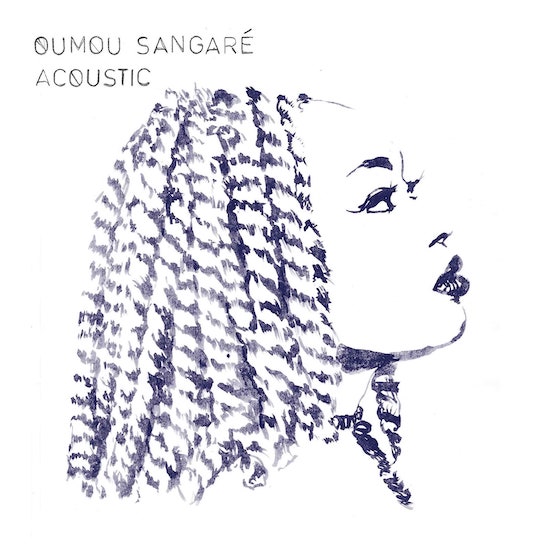The Songbird of Wassoulou, as Oumou Sangaré is also known, has not released an album of new material since Mogoya in 2017. That is not to say the Malian singer has not been busy reworking that set of material.
Mogoya updated Sangaré’s traditional West African roots music with contemporary R’n’B production and was boosted by the idiosyncratic playing of the late Afrobeat drummer Tony Allen. A remix of the some of the tracks appeared the following year. In a recent Baker’s Dozen feature, Sangaré told tQ: “I wasn’t necessarily surprised by what people did with my music because I knew their work but it was just beautiful.”
And now, this time in an unplugged setting, many of the songs are once more reimagined on Acoustic. Over this period the songs have grown organically and the stripped back versions of the tracks are what we hear on these recordings. Electric guitars and keyboards make way for acoustic guitar and kamele ngoni – a traditional banjo-harp. The idea for the ‘acoustic’ set was originally conceived for a fifteenth anniversary bash of Sangaré’s record label No Format in London. It worked out so well they repeated the set in a Paris studio for the album presented here. More impressively, the versions captured on tape were all recorded live and with no additional overdubs. That it sounds so exquisite is testament to the gel between the group, who perform the intricate arrangements with a natural fluidity.
Like Ali Farka Touré – who is credited with championing Sangaré when she was unknown outside of Mali, the latest versions of the tracks reveal more in the spaces where there is nothing playing. As a frontwoman, Sangaré is a commanding presence and she clearly revels in this situation. The intimate performance brings Sangaré closer to the listener and her delivery is as if talking to you, and her backing vocalists, laughing and whooping ad libs outside of the lyric delivery as they accentuate her phrases with their own responses, as if they are sharing a conversation, “I greet Malians, Sangaré Oumou says good evening to you”. And while the musicianship displays dexterity and mastery of the instruments, you are never in any doubt who is running the show.
From the sweet vocal harmonies that open the album, over tightly knotted riffs, the message is defiantly not to take advantage of her – “Stop lying to me, don’t mess me about” on ‘Kamelemba (The Womaniser)’. While acknowledging the fault, she is quick not to make a judgement, as “you don’t know the fate of your own”.
‘Diaraby Nene (Shivers Of Love)’ that originally appeared on 1991 debut album Moussolou is one of Sangaré’s earlier taboo-breaking tracks about the power of love and is revisited here, standing up alongside the more recent material as Sangaré has continued. In this setting the songs unfold with golden threads of majestic sound, Sangaré’s storytelling lyrics document social and cultural issues. The song reached a wider audience yet, when Beyoncé used a prominent sample from ‘Diaraby Nene’ on her ‘MOOD 4 EVA’ track included on the The Lion King: The Gift soundtrack and accompanying film last year.
‘Mali Nialé’ is a song of praise for ‘Beautiful Mali’ suggesting those who have left the country to find their fortune elsewhere could be surprised on their return to see how the country has evolved. And if you have burned your bridges? “Slander cannot kill anyone, If it did, Sangaré Oumou would have been gone by now”.
The pared down arrangements showcase a set of mostly previously released material in a way previously unheard. The at times slightly slower pace reveals more depth and warmth to the arrangements and, if anything, offer more than in this form than they were originally presented.



